【中考夺分天天练】2015届中考英语(人教版)总复习 第二篇 语法精点击 专题13 简单句陈述句、疑问句、感叹句、祈使句、倒装句)(共57张PPT)
文档属性
| 名称 | 【中考夺分天天练】2015届中考英语(人教版)总复习 第二篇 语法精点击 专题13 简单句陈述句、疑问句、感叹句、祈使句、倒装句)(共57张PPT) |  | |
| 格式 | zip | ||
| 文件大小 | 109.7KB | ||
| 资源类型 | 教案 | ||
| 版本资源 | |||
| 科目 | 英语 | ||
| 更新时间 | 2014-12-05 06:45:50 | ||
图片预览

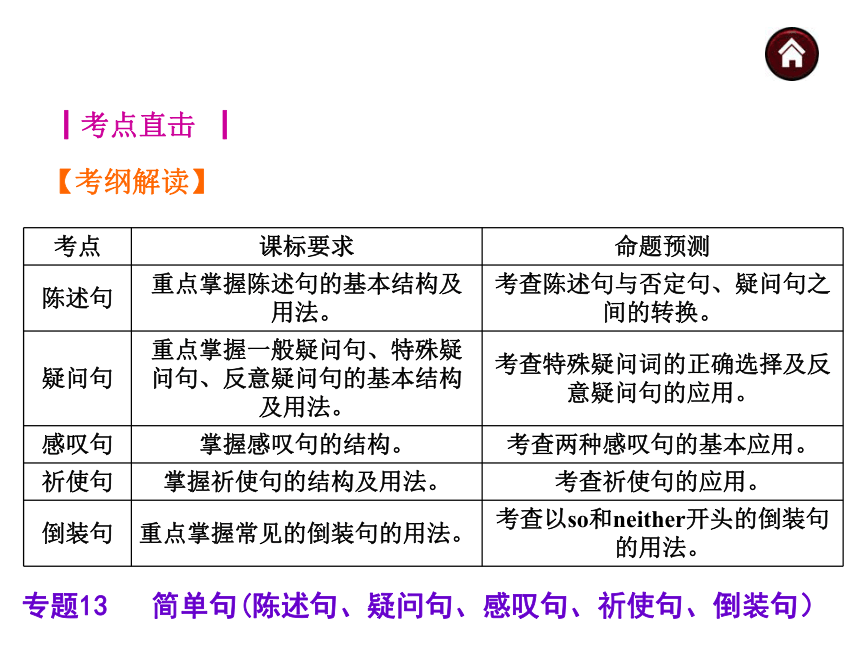
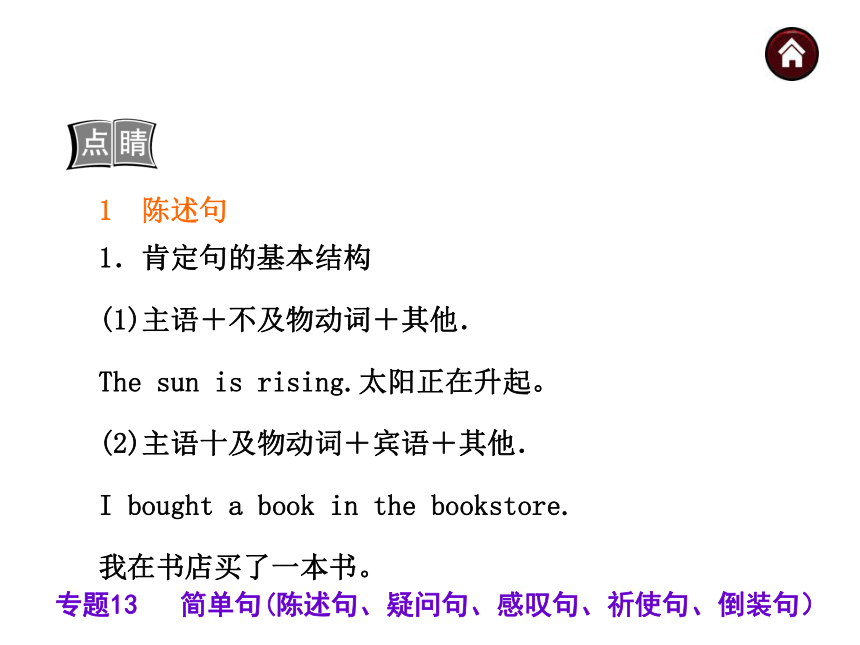
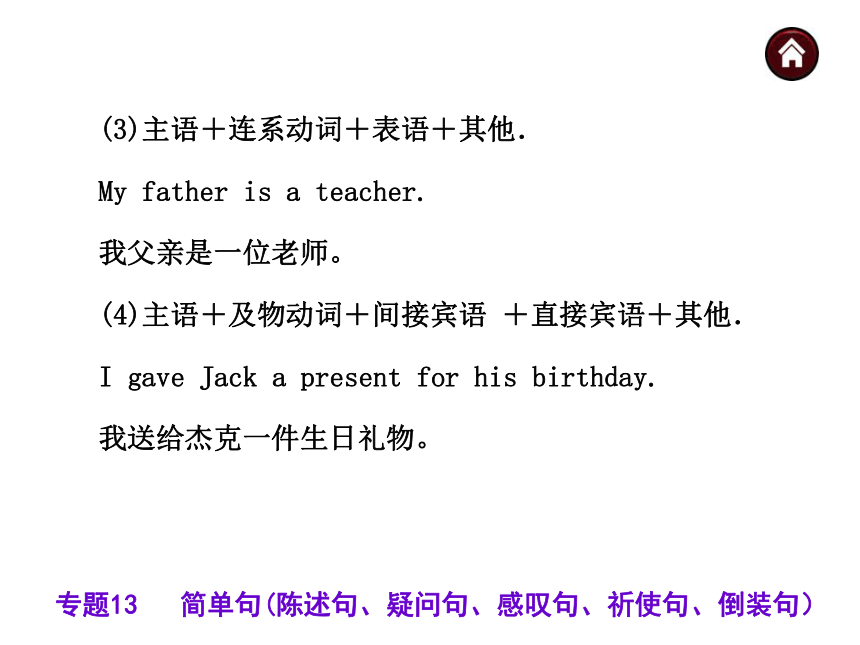
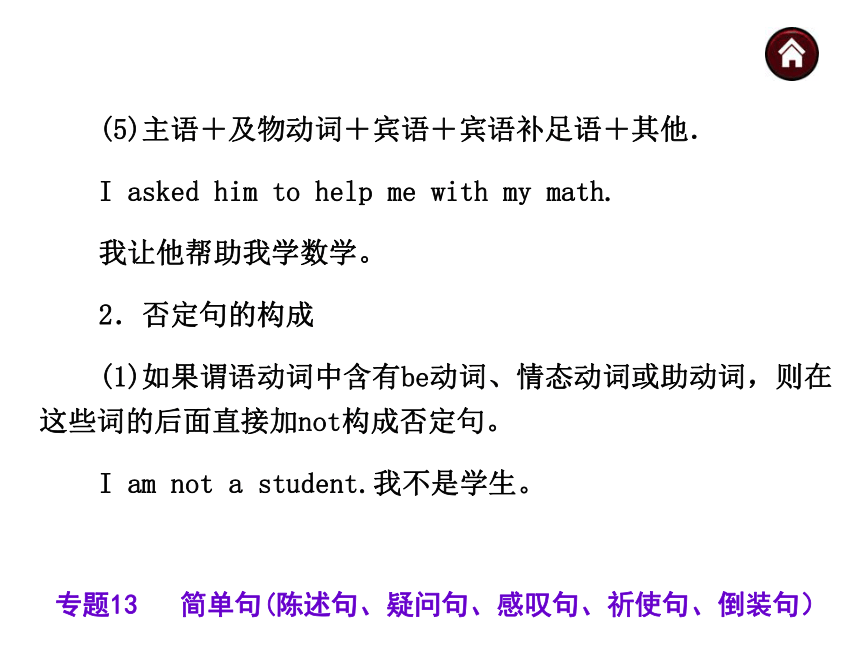
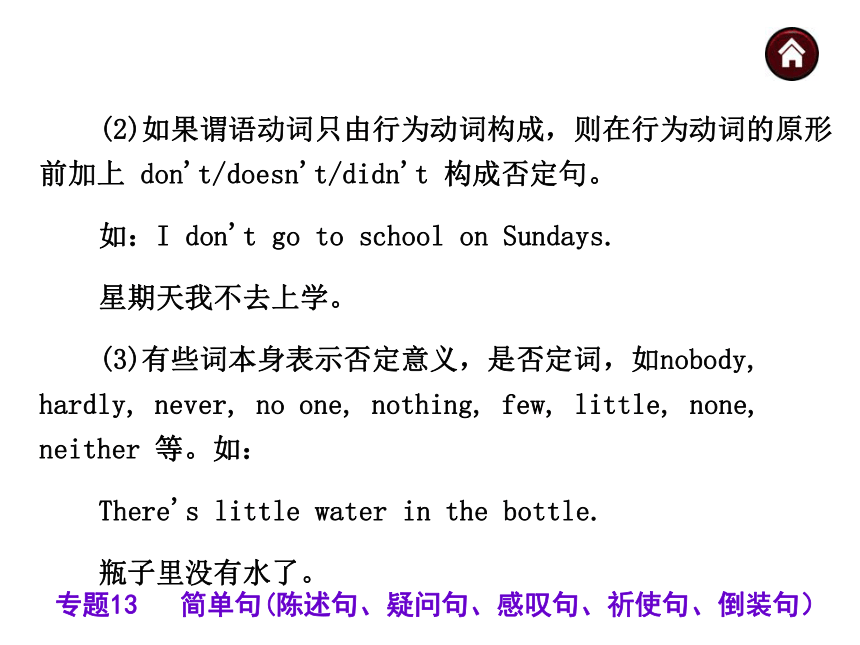
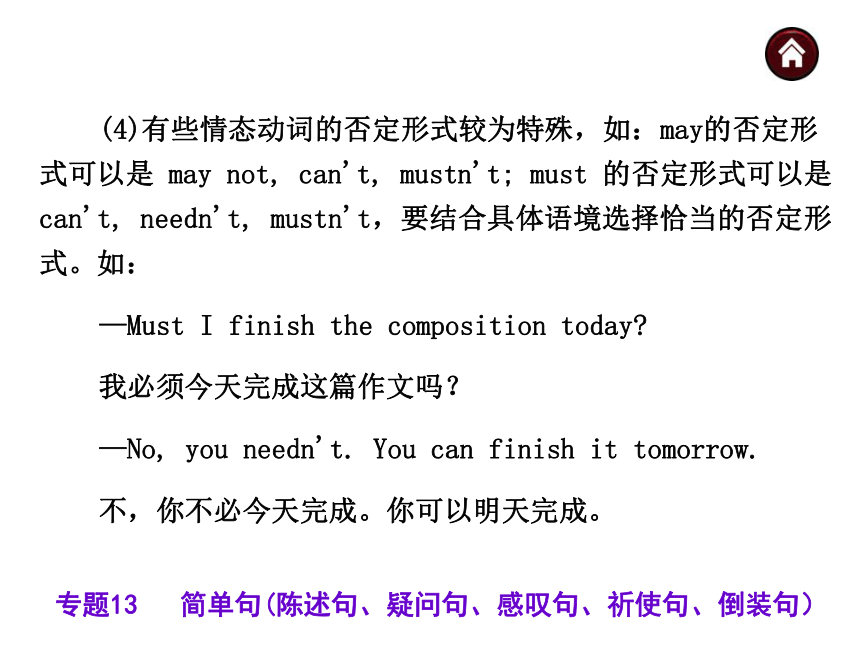
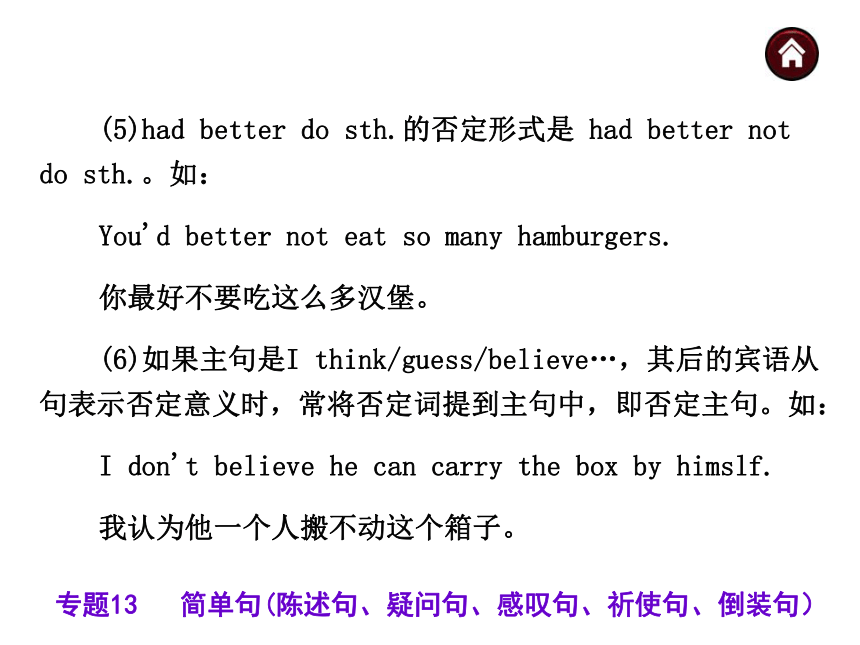
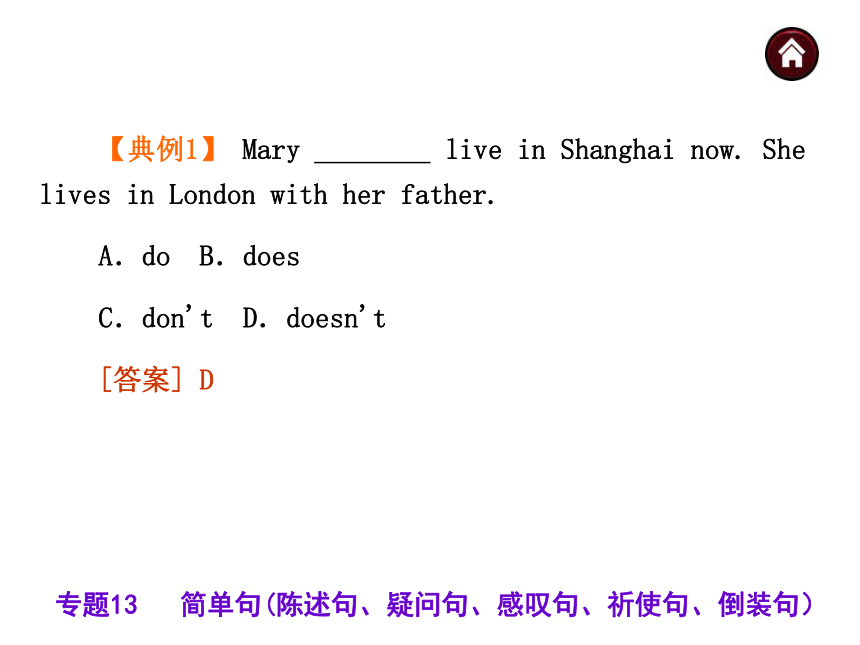
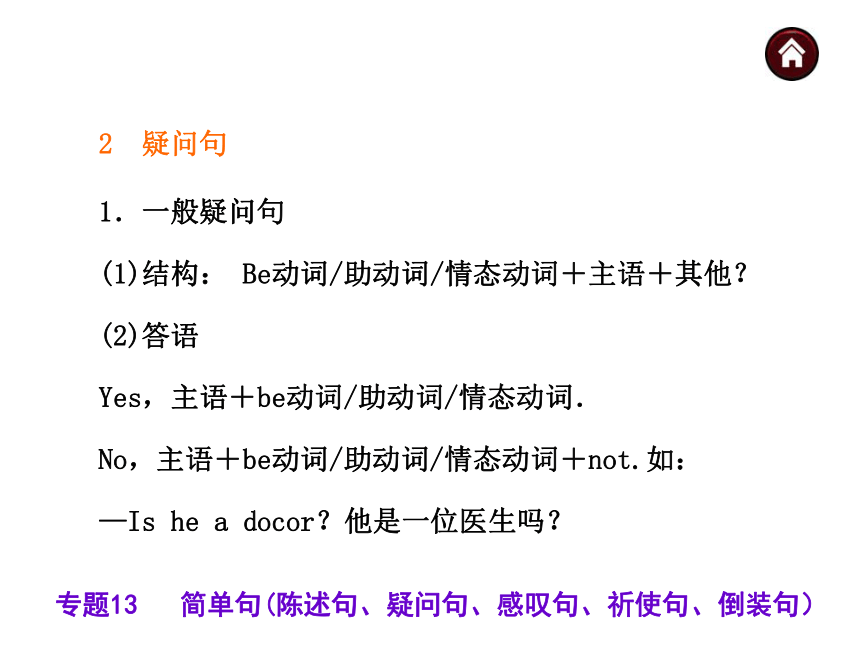
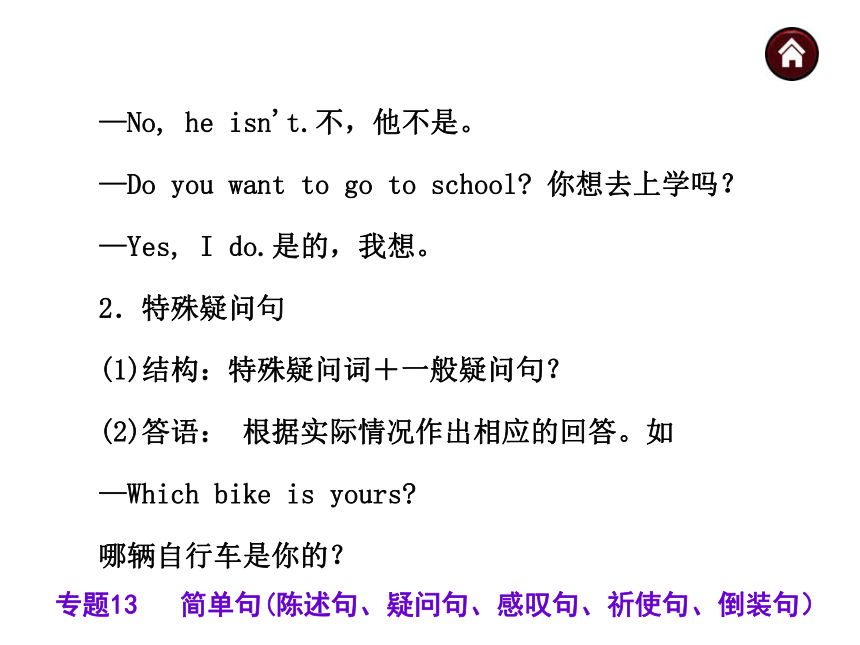
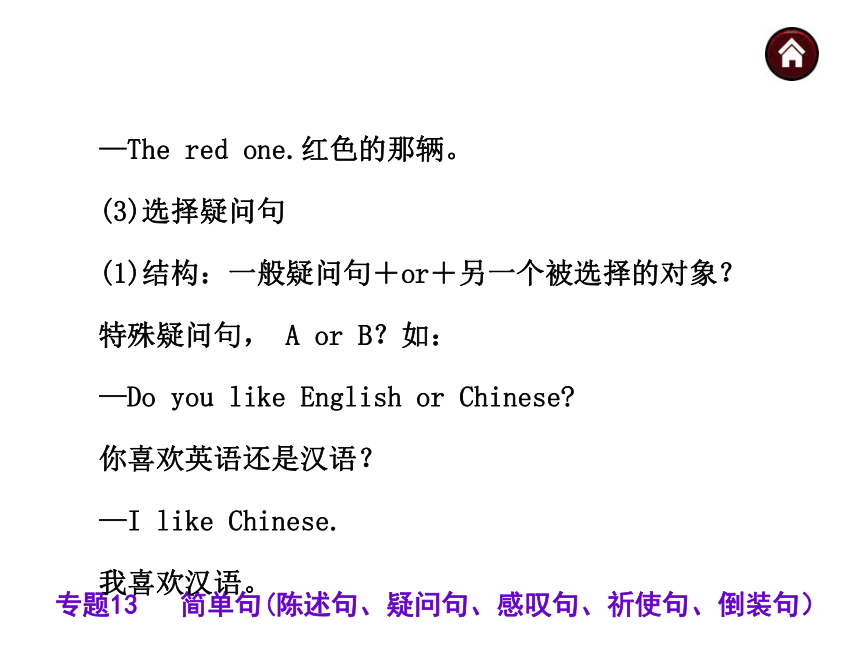
文档简介
课件57张PPT。专题13 简单句(陈述句、疑问句、感叹句、祈使句、倒装句)专题13 简单句(陈述句、疑问句、感叹句、祈使句、倒装句)┃考点直击 ┃【考纲解读】专题13 简单句(陈述句、疑问句、感叹句、祈使句、倒装句)1 陈述句 1.肯定句的基本结构
(1)主语+不及物动词+其他.
The sun is rising.太阳正在升起。
(2)主语十及物动词+宾语+其他.
I bought a book in the bookstore.
我在书店买了一本书。专题13 简单句(陈述句、疑问句、感叹句、祈使句、倒装句)(3)主语+连系动词+表语+其他.
My father is a teacher.
我父亲是一位老师。
(4)主语+及物动词+间接宾语 +直接宾语+其他.
I gave Jack a present for his birthday.
我送给杰克一件生日礼物。专题13 简单句(陈述句、疑问句、感叹句、祈使句、倒装句)(5)主语+及物动词+宾语+宾语补足语+其他.
I asked him to help me with my math.
我让他帮助我学数学。
2.否定句的构成
(1)如果谓语动词中含有be动词、情态动词或助动词,则在这些词的后面直接加not构成否定句。
I am not a student.我不是学生。专题13 简单句(陈述句、疑问句、感叹句、祈使句、倒装句)(2)如果谓语动词只由行为动词构成,则在行为动词的原形前加上 don't/doesn't/didn't 构成否定句。
如:I don't go to school on Sundays.
星期天我不去上学。
(3)有些词本身表示否定意义,是否定词,如nobody, hardly, never, no one, nothing, few, little, none, neither 等。如:
There's little water in the bottle.
瓶子里没有水了。专题13 简单句(陈述句、疑问句、感叹句、祈使句、倒装句)(4)有些情态动词的否定形式较为特殊,如:may的否定形式可以是 may not, can't, mustn't; must 的否定形式可以是 can't, needn't, mustn't,要结合具体语境选择恰当的否定形式。如:
—Must I finish the composition today?
我必须今天完成这篇作文吗?
—No, you needn't. You can finish it tomorrow.
不,你不必今天完成。你可以明天完成。专题13 简单句(陈述句、疑问句、感叹句、祈使句、倒装句)(5)had better do sth.的否定形式是 had better not do sth.。如:
You'd better not eat so many hamburgers.
你最好不要吃这么多汉堡。
(6)如果主句是I think/guess/believe…,其后的宾语从句表示否定意义时,常将否定词提到主句中,即否定主句。如:
I don't believe he can carry the box by himslf.
我认为他一个人搬不动这个箱子。专题13 简单句(陈述句、疑问句、感叹句、祈使句、倒装句)【典例1】 Mary ________ live in Shanghai now. She lives in London with her father.
A.do B.does
C.don't D.doesn't
[答案] D专题13 简单句(陈述句、疑问句、感叹句、祈使句、倒装句)2 疑问句 1.一般疑问句
(1)结构: Be动词/助动词/情态动词+主语+其他?
(2)答语
Yes,主语+be动词/助动词/情态动词.
No,主语+be动词/助动词/情态动词+not.如:
—Is he a docor?他是一位医生吗?专题13 简单句(陈述句、疑问句、感叹句、祈使句、倒装句)—No, he isn't.不,他不是。
—Do you want to go to school? 你想去上学吗?
—Yes, I do.是的,我想。
2.特殊疑问句
(1)结构:特殊疑问词+一般疑问句?
(2)答语: 根据实际情况作出相应的回答。如
—Which bike is yours?
哪辆自行车是你的?专题13 简单句(陈述句、疑问句、感叹句、祈使句、倒装句)—The red one.红色的那辆。
(3)选择疑问句
(1)结构:一般疑问句+or+另一个被选择的对象?
特殊疑问句, A or B?如:
—Do you like English or Chinese?
你喜欢英语还是汉语?
—I like Chinese.
我喜欢汉语。专题13 简单句(陈述句、疑问句、感叹句、祈使句、倒装句)Which do you prefer, apples or bananas?
苹果和香蕉,你更喜欢哪个?
—Apples.苹果。
(2)答语:根据实际情况回答。
4.反意疑问句
(1)结构:
陈述句(肯定形式)+附加疑问句(否定形式)?
陈述句(否定形式)+附加疑问句(肯定形式)?专题13 简单句(陈述句、疑问句、感叹句、祈使句、倒装句)(2)答语:
与一般疑问句的答语相同,但注意在问答“前否后肯”形式的反意疑问句时,yes和no在意义上的变化(此时yes的意思是“不”,no 的意思是 “是”)。如:
—You didn't go to school yesterday, did you?
你昨天没去学校,是吗?
—Yes, I did.不,我去上学了。
—No, I didn't.是的,我没去上学。专题13 简单句(陈述句、疑问句、感叹句、祈使句、倒装句)(3)附加疑问句部分的注意事项
①附加疑问句部分的主语一般为人称代词主格,但必须和陈述句部分的主语保持一致。如:
Mr. Black teaches you English this term, doesn't he?
这学期,布莱克先生教你们英语,不是吗?专题13 简单句(陈述句、疑问句、感叹句、祈使句、倒装句)②陈述句为there be句型,附加疑问句部分用be there。如:
There is a pen on the desk, isn't there?
书桌上有一支钢笔,不是吗?
③陈述句的主语是指示代词单数形式、表示物的不定代词、动词不定式、动词-ing形式或从句时,附加疑问句部分的主语用 it;如果指示代词是复数形式,则用they。如:专题13 简单句(陈述句、疑问句、感叹句、祈使句、倒装句)Drinking too much coffee is bad for your health, isn't it?喝太多咖啡对你的健康有害,不是吗?
These are your books, aren't they?
这些是你的书,不是吗?
④陈述句的主语是表示人的不定代词时,附加疑问句部分的主语一般为they,也可以是he。如:
Nobody is late for school, are they?
没有人上学迟到,是吗?专题13 简单句(陈述句、疑问句、感叹句、祈使句、倒装句)⑤陈述句为复合句时,附加疑问句部分的主语与主句的主语保持一致;如果复合句是I think/believe/guess that…,附加疑问句部分的主语与从句的主语保持一致。如:
You don't know where your pen pal is from, do you? 你不知道你的笔友来自哪里,是吗?
I don't think you are right, are you?
我认为你是错误的,不是吗?专题13 简单句(陈述句、疑问句、感叹句、祈使句、倒装句)⑥陈述句是“Do/Be型的肯定祈使句”时,附加疑问句部分用will/won't you结构;如果是否定祈使句,则用will you。如:
Don't make so much noise, will you?
不要制造噪声好吗?
Open the door for me, will/won't you?
为我开门好吗?专题13 简单句(陈述句、疑问句、感叹句、祈使句、倒装句)⑦陈述句是“Let's型的肯定祈使句”时,附加疑问句部分用shall we;陈述句是“Let me型的肯定祈使句”时,附加疑问句部分用 will you。如:
Let's go swimming, shall we?
让我们去游泳好吗?
Let me carry the box for you, will you?
让我帮你搬这个箱子好吗?专题13 简单句(陈述句、疑问句、感叹句、祈使句、倒装句)⑧若陈述句中含有 little, few, nothing, nobody, never, none等否定词时,附加疑问句部分用肯定结构。如:
There's nobody in the room, is there?
房间里没人,是吗?专题13 简单句(陈述句、疑问句、感叹句、祈使句、倒装句)【典例2】 —________ have you stayed in New York?
—For about two weeks.
A.How far B.How long
C.How many D.How often
[解析] B how far意为“多远”,对距离提问;how long意为“多久”,对时间段提问;how many意为“多少”,对数量提问;how often意为“多久一次”,对频率提问。根据答语“大约两周”可知选B。专题13 简单句(陈述句、疑问句、感叹句、祈使句、倒装句)【典例3】 She can hardly write her own name, ________?
A.can she B.can't she
C.need she D.needn't she
[答案] A专题13 简单句(陈述句、疑问句、感叹句、祈使句、倒装句)3 感叹句 专题13 简单句(陈述句、疑问句、感叹句、祈使句、倒装句)【典例4】 —________ weather! It's raining.
—Bad luck! We can't go climbing today.
A.What bad B.How bad
C.What fine D.How fine
[解析] A 根据答语“真倒霉,我们今天不能去爬山了”可知上句的句意为“多么糟糕的天气啊!正在下雨”。weather为不可数名词,故用what。故选A。专题13 简单句(陈述句、疑问句、感叹句、祈使句、倒装句)【典例5】 —Dad, do you like my picture?
—________ It's the nicest one I've ever seen!
A.What beautiful!
B.How careful!
C.How wonderful!
D.What wonderful picture!专题13 简单句(陈述句、疑问句、感叹句、祈使句、倒装句)[解析] C 根据答语中“这是我曾经看到过的最漂亮的一幅画”可知应该是赞叹儿子的画。修饰形容词用how, 故A项错误;B项和句意不符;修饰单数名词用不定冠词a,故D项错误。故选C。 专题13 简单句(陈述句、疑问句、感叹句、祈使句、倒装句)4 祈使句 专题13 简单句(陈述句、疑问句、感叹句、祈使句、倒装句)【典例6】 —________ here on time next time, or you'll be punished.
—Sorry for being late again.
A.Be B.Being
C.To be D.Been
[答案] A专题13 简单句(陈述句、疑问句、感叹句、祈使句、倒装句)【典例7】 —________ give up, Mary.
—Thanks for encouraging me.
A.Don't B.Don't be
C.Not be D.Be not
[解析] A 本题考查祈使句的否定句。祈使句的否定直接在动词前加Don't。故选A。专题13 简单句(陈述句、疑问句、感叹句、祈使句、倒装句)4 倒装句 专题13 简单句(陈述句、疑问句、感叹句、祈使句、倒装句)专题13 简单句(陈述句、疑问句、感叹句、祈使句、倒装句)【典例8】 —Liu Huan sings quite well. I like him very much.
—________.
A.So am I B.So I do
C.So do I D.So can I
[答案] C 专题13 简单句(陈述句、疑问句、感叹句、祈使句、倒装句)┃考点过关┃( )1. 2014·合肥45中模拟Philip, please put away your socks, ________?
A.do you B.don't you
C.did you D.won't you D表示肯定的祈使句的附加疑问句部分用will you或won't you。故选D。专题13 简单句(陈述句、疑问句、感叹句、祈使句、倒装句)( )2. 2014·合肥45中模拟—I hear Jay's concert will be held in Hefei on May 17th.
—________ exciting message!
A.How B.What
C.How an D.What an D专题13 简单句(陈述句、疑问句、感叹句、祈使句、倒装句)( )3.2014·合肥45中模拟—________ do you go to the cinema, Linda?
—Not even once!
A.How much B.How soon
C.How often D.How long C根据答语“一次也没有”可知是对频率进行提问,故用how often。专题13 简单句(陈述句、疑问句、感叹句、祈使句、倒装句)( )4.—________ smoke here, Dad. Smoking has been banned(禁止) in public places.
—You're right.
A.Don't be B.Be not
C.Not to be D.Don't D专题13 简单句(陈述句、疑问句、感叹句、祈使句、倒装句)( )5.2014·六安轻工学校模拟—Who put the key on the desk just now?
—I ________.
A.does B.do
C.did D.doingC根据时间状语just now可知用一般过去时,这里要用did代替上述的情况。专题13 简单句(陈述句、疑问句、感叹句、祈使句、倒装句)( )6.2014·六安轻工学校模拟He's never been to the Great wall, ________ ?
A.is he B.isn't he
C.hasn't he D.has heD陈述句部分含有never,附加疑问句部分用肯定形式,根据前句的助动词has,可知选D。专题13 简单句(陈述句、疑问句、感叹句、祈使句、倒装句)( )7.2014·合肥45中模拟—We like play-ing tennis after school.
—________.
A.So I do B.So do I
C.So am I D.So I am B表示“也是如此”用“so+谓语+主语”。根据上句可知这里用助动词do。故选B。专题13 简单句(陈述句、疑问句、感叹句、祈使句、倒装句)( )8.2014·合肥寿春中学模拟—You haven't been to Hawaii, have you?
—________. How I wish to go there.
A.Yes, I have B.Yes, I did
C.No, I didn't D.No, I haven't D根据答语中“我多么希望去那里”可知对方没有去过夏威夷。对反意疑问句进行回答时,若事实是肯定的,就用yes;若事实是否定的,就用No。故选D。专题13 简单句(陈述句、疑问句、感叹句、祈使句、倒装句)( )1. 2014·安顺I don't think she will agree with us, ________?
A.will she B.won't she
C.don't you D.do you语法专练AI think引导的宾语从句的附加疑问句的主语与从句保持一致。故选A。专题13 简单句(陈述句、疑问句、感叹句、祈使句、倒装句)( )2. 2014·赤峰________ kind girl Nancy is! She is always ready to help the students in trouble.
A.What a B.What C.How D.How a
( )3. 2014·上海—________ can you finish the report on food safety?
—In two days.
A.How far B.How much C.How often D.How soonAD对“in+时间段”提问用how soon。专题13 简单句(陈述句、疑问句、感叹句、祈使句、倒装句)( )4. 2014·乌鲁木齐—He's already come back to Australia, ________?
—Yes. We watched a movie together last night.
A.isn't he B.doesn't he C.hasn't he D.has he
( )5.Boys and girls, ________ your hands if you want to take part in the summer camp.
A.putting up B.to put up C.put up D.put CC根据句意可知是祈使句,put up意为“举起”。故选C。专题13 简单句(陈述句、疑问句、感叹句、祈使句、倒装句)( )6.—I hear Yang made an English speech at the graduation ceremony yesterday.
—________, and ________.
A.So she did; so did I B.So did she; so I did
C.So she was; so I was D.So was she; so I wasA第一个空表达的意思是“她确实如此”,用“so+主语+谓语”;第二个空表达的意思是“我也一样”,要用“so+谓语+主语”。故选A。专题13 简单句(陈述句、疑问句、感叹句、祈使句、倒装句)( )7.—________ won the 100th gold medal at the Olympics for China?
—Zhang Yining. She's from Beijing.
A.Who B.What
C.When D.WhereA专题13 简单句(陈述句、疑问句、感叹句、祈使句、倒装句)( )8.—________ did you graduate from primary school?
—At the age of 11. A.When B.How
C.Where D.Why A由答语可知是对时间提问,故选A。专题13 简单句(陈述句、疑问句、感叹句、祈使句、倒装句)( )9.________ sunny day! Let's go surfing, Frank!
A.What a B.What
C.How a D.How an A专题13 简单句(陈述句、疑问句、感叹句、祈使句、倒装句)( )10.The sun is so bright. Let's go fishing, ________?
A.don't you B.will you
C.do you D.shall weDlet's型祈使句的附加疑问句部分用shall we。故选D。专题13 简单句(陈述句、疑问句、感叹句、祈使句、倒装句)( )11. 2014·宿迁—________ have you lived in Suqian, Jane?
—For about 16 years.
A.How many B.How much
C.How long D.How oftenfor about 16 years为一段时间,对其提问用how long。专题13 简单句(陈述句、疑问句、感叹句、祈使句、倒装句)( )12. 2014·曲靖________ funny the joke is! It makes us smile from ears to ears.
A.What an B.What C.How an D. How D感叹句中修饰形容词用how。专题13 简单句(陈述句、疑问句、感叹句、祈使句、倒装句)( )13. 2014·黄石—I'm leaving for Xisai Mountain this afternoon.
—________ you have packed everything.
A.To be sure B.Been sure
C.Being sure D.Be sureD答语句意:确保你把所有的东西都收拾好了。根据句意可知本句为祈使句。祈使句句首用动词原形。故选D。专题13 简单句(陈述句、疑问句、感叹句、祈使句、倒装句)( )14. 2014·眉山________ swim alone in the river, ________?
A.Not; don't you B.Not; do you
C.Don't; will you D.Don't; shall weC祈使句的否定句是在动词前直接加Don't;表示否定意义的祈使句的附加疑问句为will you。故选C。专题13 简单句(陈述句、疑问句、感叹句、祈使句、倒装句)( )15. 2014·镇江—Do you know the book One Hundred Years of Solitude(《百年孤独》) has been printed again?
—It is expected to be. ________ un-usual novel it is!
A.What B.What a
C.How D.What anD专题13 简单句(陈述句、疑问句、感叹句、祈使句、倒装句)( )16.—________ stay uptoo late, or you will feel tired in class next day.
—I won't, Mom.
A.Not B.Don't
C.Didn't D.Isn't B专题13 简单句(陈述句、疑问句、感叹句、祈使句、倒装句)( )17.—My parents never stop going on about (唠叨)how I should study hard.
—________.
A.So my parents do B.Nor my parents do
C.Nor do my parents D.So do my parentsC由上句中的never可知这是一个否定句,当表示前面的情况也适于另一个人时,用“nor+谓语+主语”结构,排除A、D,B项的语序不正确,故选C。专题13 简单句(陈述句、疑问句、感叹句、祈使句、倒装句)( )18.—It's terribly cold today, isn't it?
—Yes. ________ yesterday.
A.So it was B.So was it
C.So it is D.So is it B
(1)主语+不及物动词+其他.
The sun is rising.太阳正在升起。
(2)主语十及物动词+宾语+其他.
I bought a book in the bookstore.
我在书店买了一本书。专题13 简单句(陈述句、疑问句、感叹句、祈使句、倒装句)(3)主语+连系动词+表语+其他.
My father is a teacher.
我父亲是一位老师。
(4)主语+及物动词+间接宾语 +直接宾语+其他.
I gave Jack a present for his birthday.
我送给杰克一件生日礼物。专题13 简单句(陈述句、疑问句、感叹句、祈使句、倒装句)(5)主语+及物动词+宾语+宾语补足语+其他.
I asked him to help me with my math.
我让他帮助我学数学。
2.否定句的构成
(1)如果谓语动词中含有be动词、情态动词或助动词,则在这些词的后面直接加not构成否定句。
I am not a student.我不是学生。专题13 简单句(陈述句、疑问句、感叹句、祈使句、倒装句)(2)如果谓语动词只由行为动词构成,则在行为动词的原形前加上 don't/doesn't/didn't 构成否定句。
如:I don't go to school on Sundays.
星期天我不去上学。
(3)有些词本身表示否定意义,是否定词,如nobody, hardly, never, no one, nothing, few, little, none, neither 等。如:
There's little water in the bottle.
瓶子里没有水了。专题13 简单句(陈述句、疑问句、感叹句、祈使句、倒装句)(4)有些情态动词的否定形式较为特殊,如:may的否定形式可以是 may not, can't, mustn't; must 的否定形式可以是 can't, needn't, mustn't,要结合具体语境选择恰当的否定形式。如:
—Must I finish the composition today?
我必须今天完成这篇作文吗?
—No, you needn't. You can finish it tomorrow.
不,你不必今天完成。你可以明天完成。专题13 简单句(陈述句、疑问句、感叹句、祈使句、倒装句)(5)had better do sth.的否定形式是 had better not do sth.。如:
You'd better not eat so many hamburgers.
你最好不要吃这么多汉堡。
(6)如果主句是I think/guess/believe…,其后的宾语从句表示否定意义时,常将否定词提到主句中,即否定主句。如:
I don't believe he can carry the box by himslf.
我认为他一个人搬不动这个箱子。专题13 简单句(陈述句、疑问句、感叹句、祈使句、倒装句)【典例1】 Mary ________ live in Shanghai now. She lives in London with her father.
A.do B.does
C.don't D.doesn't
[答案] D专题13 简单句(陈述句、疑问句、感叹句、祈使句、倒装句)2 疑问句 1.一般疑问句
(1)结构: Be动词/助动词/情态动词+主语+其他?
(2)答语
Yes,主语+be动词/助动词/情态动词.
No,主语+be动词/助动词/情态动词+not.如:
—Is he a docor?他是一位医生吗?专题13 简单句(陈述句、疑问句、感叹句、祈使句、倒装句)—No, he isn't.不,他不是。
—Do you want to go to school? 你想去上学吗?
—Yes, I do.是的,我想。
2.特殊疑问句
(1)结构:特殊疑问词+一般疑问句?
(2)答语: 根据实际情况作出相应的回答。如
—Which bike is yours?
哪辆自行车是你的?专题13 简单句(陈述句、疑问句、感叹句、祈使句、倒装句)—The red one.红色的那辆。
(3)选择疑问句
(1)结构:一般疑问句+or+另一个被选择的对象?
特殊疑问句, A or B?如:
—Do you like English or Chinese?
你喜欢英语还是汉语?
—I like Chinese.
我喜欢汉语。专题13 简单句(陈述句、疑问句、感叹句、祈使句、倒装句)Which do you prefer, apples or bananas?
苹果和香蕉,你更喜欢哪个?
—Apples.苹果。
(2)答语:根据实际情况回答。
4.反意疑问句
(1)结构:
陈述句(肯定形式)+附加疑问句(否定形式)?
陈述句(否定形式)+附加疑问句(肯定形式)?专题13 简单句(陈述句、疑问句、感叹句、祈使句、倒装句)(2)答语:
与一般疑问句的答语相同,但注意在问答“前否后肯”形式的反意疑问句时,yes和no在意义上的变化(此时yes的意思是“不”,no 的意思是 “是”)。如:
—You didn't go to school yesterday, did you?
你昨天没去学校,是吗?
—Yes, I did.不,我去上学了。
—No, I didn't.是的,我没去上学。专题13 简单句(陈述句、疑问句、感叹句、祈使句、倒装句)(3)附加疑问句部分的注意事项
①附加疑问句部分的主语一般为人称代词主格,但必须和陈述句部分的主语保持一致。如:
Mr. Black teaches you English this term, doesn't he?
这学期,布莱克先生教你们英语,不是吗?专题13 简单句(陈述句、疑问句、感叹句、祈使句、倒装句)②陈述句为there be句型,附加疑问句部分用be there。如:
There is a pen on the desk, isn't there?
书桌上有一支钢笔,不是吗?
③陈述句的主语是指示代词单数形式、表示物的不定代词、动词不定式、动词-ing形式或从句时,附加疑问句部分的主语用 it;如果指示代词是复数形式,则用they。如:专题13 简单句(陈述句、疑问句、感叹句、祈使句、倒装句)Drinking too much coffee is bad for your health, isn't it?喝太多咖啡对你的健康有害,不是吗?
These are your books, aren't they?
这些是你的书,不是吗?
④陈述句的主语是表示人的不定代词时,附加疑问句部分的主语一般为they,也可以是he。如:
Nobody is late for school, are they?
没有人上学迟到,是吗?专题13 简单句(陈述句、疑问句、感叹句、祈使句、倒装句)⑤陈述句为复合句时,附加疑问句部分的主语与主句的主语保持一致;如果复合句是I think/believe/guess that…,附加疑问句部分的主语与从句的主语保持一致。如:
You don't know where your pen pal is from, do you? 你不知道你的笔友来自哪里,是吗?
I don't think you are right, are you?
我认为你是错误的,不是吗?专题13 简单句(陈述句、疑问句、感叹句、祈使句、倒装句)⑥陈述句是“Do/Be型的肯定祈使句”时,附加疑问句部分用will/won't you结构;如果是否定祈使句,则用will you。如:
Don't make so much noise, will you?
不要制造噪声好吗?
Open the door for me, will/won't you?
为我开门好吗?专题13 简单句(陈述句、疑问句、感叹句、祈使句、倒装句)⑦陈述句是“Let's型的肯定祈使句”时,附加疑问句部分用shall we;陈述句是“Let me型的肯定祈使句”时,附加疑问句部分用 will you。如:
Let's go swimming, shall we?
让我们去游泳好吗?
Let me carry the box for you, will you?
让我帮你搬这个箱子好吗?专题13 简单句(陈述句、疑问句、感叹句、祈使句、倒装句)⑧若陈述句中含有 little, few, nothing, nobody, never, none等否定词时,附加疑问句部分用肯定结构。如:
There's nobody in the room, is there?
房间里没人,是吗?专题13 简单句(陈述句、疑问句、感叹句、祈使句、倒装句)【典例2】 —________ have you stayed in New York?
—For about two weeks.
A.How far B.How long
C.How many D.How often
[解析] B how far意为“多远”,对距离提问;how long意为“多久”,对时间段提问;how many意为“多少”,对数量提问;how often意为“多久一次”,对频率提问。根据答语“大约两周”可知选B。专题13 简单句(陈述句、疑问句、感叹句、祈使句、倒装句)【典例3】 She can hardly write her own name, ________?
A.can she B.can't she
C.need she D.needn't she
[答案] A专题13 简单句(陈述句、疑问句、感叹句、祈使句、倒装句)3 感叹句 专题13 简单句(陈述句、疑问句、感叹句、祈使句、倒装句)【典例4】 —________ weather! It's raining.
—Bad luck! We can't go climbing today.
A.What bad B.How bad
C.What fine D.How fine
[解析] A 根据答语“真倒霉,我们今天不能去爬山了”可知上句的句意为“多么糟糕的天气啊!正在下雨”。weather为不可数名词,故用what。故选A。专题13 简单句(陈述句、疑问句、感叹句、祈使句、倒装句)【典例5】 —Dad, do you like my picture?
—________ It's the nicest one I've ever seen!
A.What beautiful!
B.How careful!
C.How wonderful!
D.What wonderful picture!专题13 简单句(陈述句、疑问句、感叹句、祈使句、倒装句)[解析] C 根据答语中“这是我曾经看到过的最漂亮的一幅画”可知应该是赞叹儿子的画。修饰形容词用how, 故A项错误;B项和句意不符;修饰单数名词用不定冠词a,故D项错误。故选C。 专题13 简单句(陈述句、疑问句、感叹句、祈使句、倒装句)4 祈使句 专题13 简单句(陈述句、疑问句、感叹句、祈使句、倒装句)【典例6】 —________ here on time next time, or you'll be punished.
—Sorry for being late again.
A.Be B.Being
C.To be D.Been
[答案] A专题13 简单句(陈述句、疑问句、感叹句、祈使句、倒装句)【典例7】 —________ give up, Mary.
—Thanks for encouraging me.
A.Don't B.Don't be
C.Not be D.Be not
[解析] A 本题考查祈使句的否定句。祈使句的否定直接在动词前加Don't。故选A。专题13 简单句(陈述句、疑问句、感叹句、祈使句、倒装句)4 倒装句 专题13 简单句(陈述句、疑问句、感叹句、祈使句、倒装句)专题13 简单句(陈述句、疑问句、感叹句、祈使句、倒装句)【典例8】 —Liu Huan sings quite well. I like him very much.
—________.
A.So am I B.So I do
C.So do I D.So can I
[答案] C 专题13 简单句(陈述句、疑问句、感叹句、祈使句、倒装句)┃考点过关┃( )1. 2014·合肥45中模拟Philip, please put away your socks, ________?
A.do you B.don't you
C.did you D.won't you D表示肯定的祈使句的附加疑问句部分用will you或won't you。故选D。专题13 简单句(陈述句、疑问句、感叹句、祈使句、倒装句)( )2. 2014·合肥45中模拟—I hear Jay's concert will be held in Hefei on May 17th.
—________ exciting message!
A.How B.What
C.How an D.What an D专题13 简单句(陈述句、疑问句、感叹句、祈使句、倒装句)( )3.2014·合肥45中模拟—________ do you go to the cinema, Linda?
—Not even once!
A.How much B.How soon
C.How often D.How long C根据答语“一次也没有”可知是对频率进行提问,故用how often。专题13 简单句(陈述句、疑问句、感叹句、祈使句、倒装句)( )4.—________ smoke here, Dad. Smoking has been banned(禁止) in public places.
—You're right.
A.Don't be B.Be not
C.Not to be D.Don't D专题13 简单句(陈述句、疑问句、感叹句、祈使句、倒装句)( )5.2014·六安轻工学校模拟—Who put the key on the desk just now?
—I ________.
A.does B.do
C.did D.doingC根据时间状语just now可知用一般过去时,这里要用did代替上述的情况。专题13 简单句(陈述句、疑问句、感叹句、祈使句、倒装句)( )6.2014·六安轻工学校模拟He's never been to the Great wall, ________ ?
A.is he B.isn't he
C.hasn't he D.has heD陈述句部分含有never,附加疑问句部分用肯定形式,根据前句的助动词has,可知选D。专题13 简单句(陈述句、疑问句、感叹句、祈使句、倒装句)( )7.2014·合肥45中模拟—We like play-ing tennis after school.
—________.
A.So I do B.So do I
C.So am I D.So I am B表示“也是如此”用“so+谓语+主语”。根据上句可知这里用助动词do。故选B。专题13 简单句(陈述句、疑问句、感叹句、祈使句、倒装句)( )8.2014·合肥寿春中学模拟—You haven't been to Hawaii, have you?
—________. How I wish to go there.
A.Yes, I have B.Yes, I did
C.No, I didn't D.No, I haven't D根据答语中“我多么希望去那里”可知对方没有去过夏威夷。对反意疑问句进行回答时,若事实是肯定的,就用yes;若事实是否定的,就用No。故选D。专题13 简单句(陈述句、疑问句、感叹句、祈使句、倒装句)( )1. 2014·安顺I don't think she will agree with us, ________?
A.will she B.won't she
C.don't you D.do you语法专练AI think引导的宾语从句的附加疑问句的主语与从句保持一致。故选A。专题13 简单句(陈述句、疑问句、感叹句、祈使句、倒装句)( )2. 2014·赤峰________ kind girl Nancy is! She is always ready to help the students in trouble.
A.What a B.What C.How D.How a
( )3. 2014·上海—________ can you finish the report on food safety?
—In two days.
A.How far B.How much C.How often D.How soonAD对“in+时间段”提问用how soon。专题13 简单句(陈述句、疑问句、感叹句、祈使句、倒装句)( )4. 2014·乌鲁木齐—He's already come back to Australia, ________?
—Yes. We watched a movie together last night.
A.isn't he B.doesn't he C.hasn't he D.has he
( )5.Boys and girls, ________ your hands if you want to take part in the summer camp.
A.putting up B.to put up C.put up D.put CC根据句意可知是祈使句,put up意为“举起”。故选C。专题13 简单句(陈述句、疑问句、感叹句、祈使句、倒装句)( )6.—I hear Yang made an English speech at the graduation ceremony yesterday.
—________, and ________.
A.So she did; so did I B.So did she; so I did
C.So she was; so I was D.So was she; so I wasA第一个空表达的意思是“她确实如此”,用“so+主语+谓语”;第二个空表达的意思是“我也一样”,要用“so+谓语+主语”。故选A。专题13 简单句(陈述句、疑问句、感叹句、祈使句、倒装句)( )7.—________ won the 100th gold medal at the Olympics for China?
—Zhang Yining. She's from Beijing.
A.Who B.What
C.When D.WhereA专题13 简单句(陈述句、疑问句、感叹句、祈使句、倒装句)( )8.—________ did you graduate from primary school?
—At the age of 11. A.When B.How
C.Where D.Why A由答语可知是对时间提问,故选A。专题13 简单句(陈述句、疑问句、感叹句、祈使句、倒装句)( )9.________ sunny day! Let's go surfing, Frank!
A.What a B.What
C.How a D.How an A专题13 简单句(陈述句、疑问句、感叹句、祈使句、倒装句)( )10.The sun is so bright. Let's go fishing, ________?
A.don't you B.will you
C.do you D.shall weDlet's型祈使句的附加疑问句部分用shall we。故选D。专题13 简单句(陈述句、疑问句、感叹句、祈使句、倒装句)( )11. 2014·宿迁—________ have you lived in Suqian, Jane?
—For about 16 years.
A.How many B.How much
C.How long D.How oftenfor about 16 years为一段时间,对其提问用how long。专题13 简单句(陈述句、疑问句、感叹句、祈使句、倒装句)( )12. 2014·曲靖________ funny the joke is! It makes us smile from ears to ears.
A.What an B.What C.How an D. How D感叹句中修饰形容词用how。专题13 简单句(陈述句、疑问句、感叹句、祈使句、倒装句)( )13. 2014·黄石—I'm leaving for Xisai Mountain this afternoon.
—________ you have packed everything.
A.To be sure B.Been sure
C.Being sure D.Be sureD答语句意:确保你把所有的东西都收拾好了。根据句意可知本句为祈使句。祈使句句首用动词原形。故选D。专题13 简单句(陈述句、疑问句、感叹句、祈使句、倒装句)( )14. 2014·眉山________ swim alone in the river, ________?
A.Not; don't you B.Not; do you
C.Don't; will you D.Don't; shall weC祈使句的否定句是在动词前直接加Don't;表示否定意义的祈使句的附加疑问句为will you。故选C。专题13 简单句(陈述句、疑问句、感叹句、祈使句、倒装句)( )15. 2014·镇江—Do you know the book One Hundred Years of Solitude(《百年孤独》) has been printed again?
—It is expected to be. ________ un-usual novel it is!
A.What B.What a
C.How D.What anD专题13 简单句(陈述句、疑问句、感叹句、祈使句、倒装句)( )16.—________ stay uptoo late, or you will feel tired in class next day.
—I won't, Mom.
A.Not B.Don't
C.Didn't D.Isn't B专题13 简单句(陈述句、疑问句、感叹句、祈使句、倒装句)( )17.—My parents never stop going on about (唠叨)how I should study hard.
—________.
A.So my parents do B.Nor my parents do
C.Nor do my parents D.So do my parentsC由上句中的never可知这是一个否定句,当表示前面的情况也适于另一个人时,用“nor+谓语+主语”结构,排除A、D,B项的语序不正确,故选C。专题13 简单句(陈述句、疑问句、感叹句、祈使句、倒装句)( )18.—It's terribly cold today, isn't it?
—Yes. ________ yesterday.
A.So it was B.So was it
C.So it is D.So is it B
同课章节目录
- 词法
- 名词
- 动词和动词短语
- 动词语态
- 动词时态
- 助动词和情态动词
- 非谓语动词
- 冠词
- 代词
- 数词和量词
- 形容词副词及其比较等级
- 介词和介词短语
- 连词和感叹词
- 构词法
- 相似、相近词比较
- 句法
- 陈述句
- 一般疑问句和否定疑问句
- 特殊疑问句及选择疑问句
- 反意疑问句
- 存在句(There be句型)
- 宾语从句
- 定语从句
- 状语从句
- 主谓一致问题
- 简单句
- 并列句
- 复合句
- 主谓一致
- 主、表语从句
- 名词性从句
- 直接引语和间接引语
- 虚拟语气
- 感叹句
- 强调句
- 倒装句
- 祈使句
- 句子的成分
- 句子的分类
- 题型专区
- 单项选择部分
- 易错题
- 完形填空
- 阅读理解
- 词汇练习
- 听说训练
- 句型转换
- 补全对话
- 短文改错
- 翻译
- 书面表达
- 任务型阅读
- 语法填空
- 其他资料
